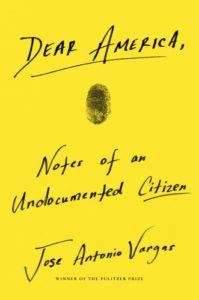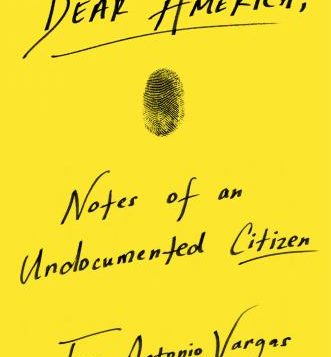 Dear America: Notes of an Undocumented Citizen
Dear America: Notes of an Undocumented Citizen
by Jose Antonio Vargas
Dey Street Books. 232 pages, $25.99
JOSE ANTONIO VARGAS spells his first name without an accent mark, because—as he explains in Dear America, his timely and riveting story of what it means to be an undocumented resident in the United States—he is Filipino by birth, not Mexican. A Pulitzer Prize-winning journalist who has lived in this country for over 25 years, Vargas is as careful with his words as with his accent marks. He rejects, for example, the term “illegal alien,” preferring to call himself an undocumented American or an undocumented citizen. (He consistently puts the word “illegal” in scare quotes.) His mission is to change a system that has forced him into a box labeled “criminal.” “I am trying to be a human being,” he asserts.
The contours of Vargas’ undocumented journey in America—what he describes as “lying, passing, hiding”—will be familiar to many in the LGBT community. In 1993, Vargas’ mother, believing that “going to America was the golden ticket to better jobs, better wages, a better life,” sent him to live with his grandparents in the heart of the Silicon Valley. But this was the other Silicon Valley, the “ethnic” one, “where you hear some Spanish, Tagalog, and Vietnamese before you hear a word of English.” By the time he was sixteen, Vargas was adjusting pretty well to his new country.
Like most teenagers, he wanted a driver’s license, so he showed up at the local DMV to apply. But when he handed the clerk his green card, she returned it to him, saying: “This is fake. Don’t come back here again.” Vargas had had no inking that he was in the country illegally. In an instant, the narrative of his life changed. Being illegal not only meant not being able to drive; it meant “limitations of what my life was and what it could be.”
It was around this time that Vargas also discovered that he was gay. These were the years—the late 90s—of Ellen DeGeneres making the cover of Time magazine, Men4Men chat rooms on AOL, and the murder of Matthew Shepherd. “There’s nothing wrong with being gay,” he kept telling himself. Baffled by “the ‘illegal’ part of me,” he embraced his gay identity, a move that “kept me alive.”
In high school, Vargas began to write for newspapers. Finding stories in the people and places around him became his way of “writing myself into America … to make myself visible.” As the time came to apply to college, he told friends he wasn’t interested, that he had a good-paying job with a local paper. The truth was that college wasn’t an option; he had no paperwork to prove that he was in the U.S. legally. The teachers and friends in whom he confided tried to help, but his options for legalization were basically nonexistent.
Happily, Vargas received a special scholarship from a venture capitalist, who didn’t care whether he had the right papers or not. The scholarship allowed him to attend San Francisco State, a university that didn’t require the usual documentation. His policy of avoiding talking about paperwork seemed to have paid off. But just before he graduated from high school, he applied for an entry-level job at a youth magazine and had to lie on the employment forms about his citizenship status, “a difficult and necessary choice to survive.”
Vargas began to understand that illegality “must be seen through the prism of who is defining what is legal for whom.” He notes that legality has always been a construct of power: “Lynchings, violent seizures of indigenous land, barring women from voting—all of that was [at one time]legal. … ‘Separate but equal’ was legal. Jim Crow was the law of the land.”
After college, he was awarded an internship at The Washington Post. “What if you get caught?” his grandfather asked him. He started feeling like “a walking time bomb.” Depression and anxiety began to take a toll. To move forward in his life, Vargas decided he had to tell the truth about himself: “To free myself—in fact, to face myself—I had to write my story.” The lawyers he consulted made him feel like he was carrying an incurable disease.
In 2011, he publicly declared his undocumented status. Believing that “journalistic service to the public good was worth more than my personal need for legal protection,” he published “My Life as an Undocumented Immigrant” in The New York Times. At the same time, he cofounded Define America, an immigrant rights organization that seeks to change the way immigrants are perceived. Inspired by the LGBT rights movements, Define America focuses on storytelling as a vehicle to influence how the news and entertainment industries portray immigrants.
Vargas criticizes the mainstream media’s coverage of immigration as “lackluster at best and irresponsible at worst, promoting and sustaining stereotypes while spreading misinformation.” Claiming he is neither a Republican nor a Democrat, he points to Fox News as dominating the way the anti-immigration narrative is framed, a story that paints undocumented immigrants as terrorists, criminals, and a threat to national security. It’s a narrative—Vargas calls it “morally bankrupt”—that dehumanizes people whose only crime is to practice “improper migration.”
“Migration is the most natural thing people do,” he writes, “the root of how civilizations, nation-states, and countries were established. The difference, however, is that when white people move, then and now, it’s seen as courageous and necessary, celebrated in history books. Yet when people of color move, legally or illegally, the migration itself is subjected to question of legality.”
Vargas confesses that coming out as an undocumented immigrant has taken its toll. The notoriety has interfered with his ability to be intimate with others. Using the language of border control, he acknowledges that he has put up walls and delineated borders “in all my relationships. … Trading a private life that was in limbo for a public life that is still in limbo made it worse.” And after more than two decades in the US, he still has no clear path to citizenship.
The book ends—around the time of Donald Trump’s inauguration—with Vargas confessing to feeling “lost and alone.” He wonders if it’s time to return to the Philippines. Despite this gloomy conclusion, Dear America is a story that highlights one man’s courage, honesty, and humanity in the face of an appallingly callous immigration system. It’s a story that should help anyone, of whatever political stripe, to understand the harrowing drama that every immigrant lives as he or she keeps “trying to be a human being.”
Philip Gambone is a regular contributor this magazine.






